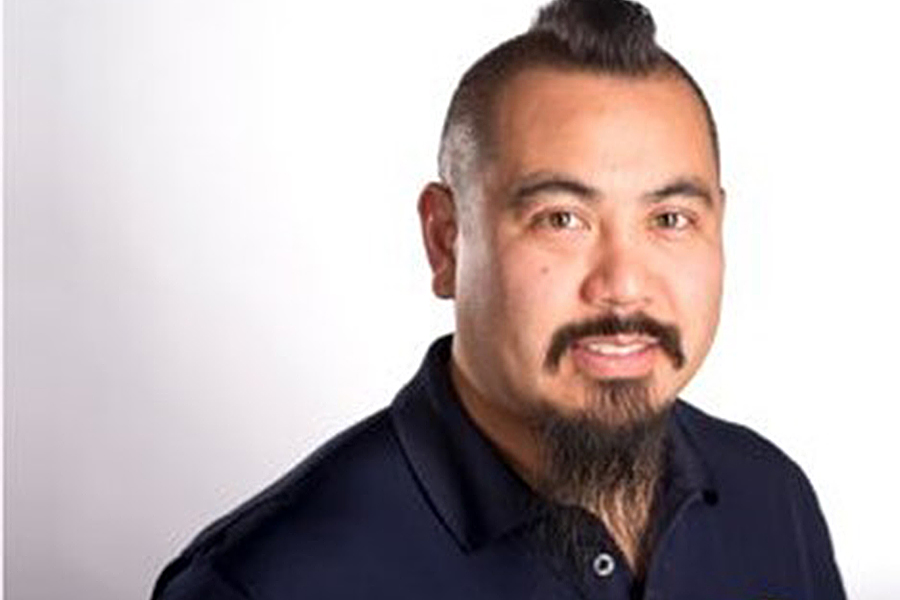Benny C. Chan is no stranger to pushing the envelope. The College of New Jersey chemistry professor said he will sometimes play with gender stereotypes to get his students to think.
“Sometimes, I’ll just put nail polish on and just wear it to class and the students will ask me, ‘Why do you have nail polish on?’ [I’ll respond], ‘Since when is nail polish gendered? Why are you asking this question, first of all? Where did this concept come that nail polish or makeup in general is just feminine?’ It’s a construct and we can deconstruct that if we want. So I do those things particularly to spark some conversations. I kind of like the controversy,” the professor laughed.
Chan last weekend was among four professionals honored at Out to Innovate 2019, the fifth biennial summit of the National Organization of Gay and Lesbian Scientists and Technical Professionals. The openly gay professor received the LGBTQ+ Educator of the Year award during the organization’s ceremony at the University of Southern California in Los Angeles.
In a statement from NOGLSTP’s evaluation committee, Chan’s work received praise for embracing diversity and inclusion in the classroom.
“It is clear from [Chan’s] references that he is an exceptional educator who sees his role beyond the classroom,” the committee said in a statement to PGN. “His participation in a wide array of service activities designed at making TCNJ a more inclusive place shows how much he cares for the well-being of all students, not just his, and not just LGBTQ+.”
Jeffrey Osborn, dean of TCNJ’s School of Science noted Chan’s work is “the result of considerable thought, reflection and research.”
Through the Howard Hughes Medical Institute’s Inclusive Excellence grant, an award that promotes engagement for undergraduate science students, Chan and other TCNJ faculty members strive to make the college’s STEM (science, technology, engineering and math) curriculum more inclusive. Chan said that many students — particularly students of color — tend to come from financially disadvantaged school districts and will often perform poorly in STEM disciplines.
“This is a nationwide phenomenon,” Chan said. “Because of the high concentration of poverty and lack of access at their schools, students end up failing out of science and engineering majors. So we’ve been doing a lot of work on trying to understand that. It feels good to do this kind of work, to help students reach their full potential and help them get over structural barriers.”
Chan said his work with the American Society of Engineering Education’s Safe Zone Project taught him about the importance of LGBTQ inclusion in the classroom and how to incorporate dialogue techniques with students and staff. He uses these skills to facilitate discussions with TCNJ staff and often pushes the faculty to think about things such as pronouns, preferred names and intersectionality.
Chan noted that the staff generally has been receptive to this process — but he noticed that sometimes, people can get “quiet” on certain topics, particularly with trans issues.
“It starts to break at that binary system of thinking,” he said. “Everything is male or female. Everything is gay or straight. So once you start working in all of this nuance, I see a little bit of pushback. It’s mostly just quiet. I’m not sure if they’re just processing it or just [choosing to] not state their disapproval.”
Chan said he plans to get the staff to think more in depth about these issues.
“[I’m] trying to get them to think about nuance — about race issues, sexuality issues [and] gender issues. And I think the biggest challenge is that people don’t want to think in the nuance because that takes work. So the main goal that I have is to continue to have dialogue about these issues and to keep talking about it.”
Other NOGLSTP honorees include LGBTQ+ Engineer of the Year Arianna T. Morales from General Motors Research Center, LGBTQ+ Scientist of the Year Jon Freeman from New York University and Walt Westman Award-winner Lauren A. Esposito from California Academy of Sciences.
